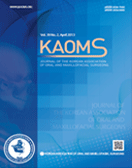Journal of the Korean Association of Oral and Maxillofacial Surgeons
- P-ISSN2234-7550
- E-ISSN2234-5930
- SCOPUS, KCI, ESCI
 ISSN : 2234-7550
ISSN : 2234-7550
Count of platelet and mean platelet volume score: serologic prognostic factor in patients with oral squamous cell carcinoma
Abstract
Objectives: TNM staging, especially for lymph node metastasis, is the scoring system most widely used among prognostic factors for cancer survival. Several biomarkers have been studied as serologic markers, but their specificity is low and clinical applications are difficult. This study aimed to estab-lish a scoring system for patients with oral squamous cell carcinoma (OSCC) using platelet (PLT) and mean platelet volume (MPV) levels measured postoperatively and to evaluate their significance as prognostic factors. Materials and Methods: We studied 40 patients admitted to the Department of Oral and Maxillofacial Surgery of Dankook University Hospital who were diagnosed with primary OSCC histopathologically between May 2006 and May 2012. Clinical pathological information obtained from the medi-cal records of each patient included age, sex, height, weight, tumor location, degree of differentiation, tumor diameter, lymph node metastasis, TNM stage, and other test values including white blood cell, MPV, PLT, C-reactive protein (CRP), and albumin obtained through a test conducted within 7 days before surgery. Count of platelet (COP)-MPV Score: Patients with both PLT and MPV values below the cut-off values were defined as score 0 (group A). Patients with at least one of the two higher than the cut-off value were defined as score 1 (group B).Results: Univariate analyses showed N-metastasis, COP-MPV (A vs B), PLT, platelet-lymphocyte ratio, and CRP were statistically significant prog-nostic factors. A multivariate Cox proportional hazards model showed N-metastasis (hazard ratio [HR] 6.227, P=0.016) and COP-MPV (A vs B) (HR 18.992, P=0.013) were independent prognostic factors with a significant effect on survival. Conclusion: COP-MPV score is a simple and cost-effective test method and is considered a more effective prognostic factor than other considered factors in predicting the prognosis of OSCC patients.
- keywords
- Oral squamous cell carcinoma, Prognostic factor, Count of platelet, Mean platelet volume
- Downloaded
- Viewed
- 0KCI Citations
- 0WOS Citations